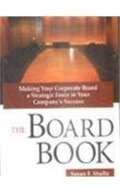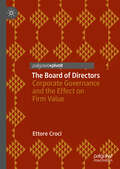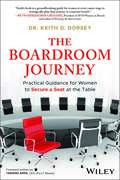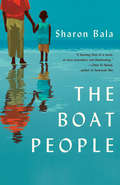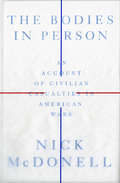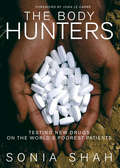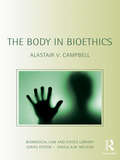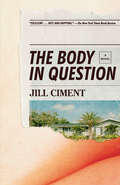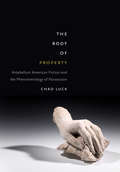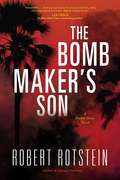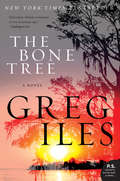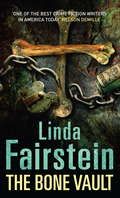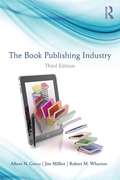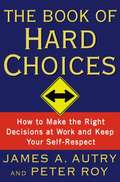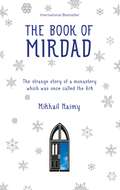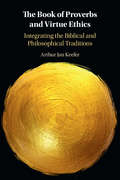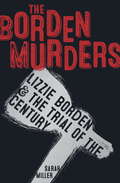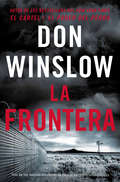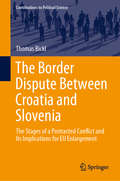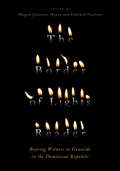- Table View
- List View
The Board Book: Making Your Corporate Board a Strategic Force in Your Company's Success
by Susan F. ShultzThe Board Book is the most succinct, reader-friendly guide available to recruiting and managing on-track, top-notch corporate boards.
The Board of Directors: Corporate Governance and the Effect on Firm Value
by Ettore CrociBoards of directors are a central feature of any corporate governance regime. The role of directors and how they affect firm value and policies is examined in depth in academic literature. However, it is easy to get both lost and overwhelmed when searching through the literature review that investigates several characteristics, often one at the time. This book provides a careful and concise look at corporate finance literature, specifically with regard to the board of directors, summarizing the main findings and reconciling them. This book documents the pros and cons associated with the various attributes of the board and the directors as found in the current literature and provides sections geared specifically to practitioners in this space, as well, allowing for a better and more comprehensive description of this important corporate governance mechanism. The resulting book aims to facilitate the interpretation of changes in corporate governance through the lens of the recent academic literature.
The Boardroom Journey: Practical Guidance for Women to Secure a Seat at the Table
by Keith D. DorseyEmpower your journey to the corporate boardroom with practical guidance and real-life examples. The Boardroom Journey: Practical Guidance for Women to Secure a Seat Table by Dr. Keith D. Dorsey offers a clear, actionable roadmap for women at any career stage to strategically build a path to the boardroom. The evidence-based strategies and inspiring success stories presented throughout this book have been gleaned from interviews with hundreds of current corporate board members. Specific tactics are outlined for early career professionals shaping their leadership journey, mid-career professionals navigating their way to the C-suite, and current and retired C-suite executives actively seeking their first (or next) corporate board seat. This book helps readers navigate the nuances of these journeys by moving from theoretical insights to actionable advice. The Boardroom Journey is an invaluable guide that helps women assess their personal motivations for career growth and board service, identify suitable boards, and enhance their board readiness through assessment tools and exercises. The book also offers strategies for building and leveraging a network of mentors, sponsors, and allies to gain support and boost confidence throughout the board journey. Inside the book: Discover strategies to effectively prepare for board service Gain insights on how to present and differentiate oneself via five types of capital Learn how to build and leverage a support team The Boardroom Journey is perfect for anyone aspiring to bring their unique perspective to corporate governance. The evidence-based strategies offered here give readers a proven method for charting an intentional path to executive service and securing a seat at the corporate boardroom table.
The Boat People: A Novel
by Sharon BalaFor readers of Khaled Hosseini and Chris Cleave, The Boat People is an extraordinary novel about a group of refugees who survive a perilous ocean voyage only to face the threat of deportation amid accusations of terrorismWhen a rusty cargo ship carrying Mahindan and five hundred fellow refugees from Sri Lanka's bloody civil war reaches Vancouver's shores, the young father thinks he and his six-year-old son can finally start a new life. Instead, the group is thrown into a detention processing center, with government officials and news headlines speculating that among the "boat people" are members of a separatist militant organization responsible for countless suicide attacks—and that these terrorists now pose a threat to Canada's national security. As the refugees become subject to heavy interrogation, Mahindan begins to fear that a desperate act taken in Sri Lanka to fund their escape may now jeopardize his and his son's chance for asylum. Told through the alternating perspectives of Mahindan; his lawyer, Priya, a second-generation Sri Lankan Canadian who reluctantly represents the refugees; and Grace, a third-generation Japanese Canadian adjudicator who must decide Mahindan's fate as evidence mounts against him, The Boat People is a spellbinding and timely novel that provokes a deeply compassionate lens through which to view the current refugee crisis.
The Bodies in Person: An Account of Civilian Casualties in American Wars
by Nick McDonellSince the beginning of the wars in Iraq and Afghanistan, uncounted thousands of civilians have died in the fighting, and as a result of the destruction. These are deaths for which no one assumes responsibility, and which have been presented, historically, as fallout. No one knows their true number. In The Bodies in Person, Nick McDonell introduces us to some of the civilians who died, along with the rescue workers who tried to save them, U.S. soldiers grappling with their deaths, and everyone in between. He shows us how decent Americans, inside and outside the government and military, looked away from the mounting death toll, even as they claimed to do everything in their power to prevent civilian casualties. With a novelist's eye — and hundreds of hours of recorded interviews — McDonell brings us the untold story of the innocent dead in America's ongoing wars, from leveled cities to drone operation centers to Capitol back rooms. As we follow him around the world, The Bodies in Person raises questions not only about what it means to be an American, but about the value of a life, what it means to risk one, and what is owed afterward.
The Body Brokers
by Brian CubanWhen his girlfriend dies of a drug overdose, lawyer Jason Feldman goes undercover to ground zero of the fentanyl epidemic to prove she was murdered.Lawyer Jason Feldman finds his girlfriend, Emily, dead of a fentanyl overdose. She was the best thing that happened to him since being forced to rebuild his life, struggling to stay sober after being falsely accused of murder, and being suspended from the practice of law. When the police write Emily&’s murder off as accidental, Jason and Emily&’s roommate, Delaney, begin their own investigation. Together, Jason and Delaney uncover a dangerous secret that endangers not only their lives, but the lives of those around them. Their journey catapults them into the corrupt addiction treatment centers that will go to any lengths to keep them from learning the truth. Their only chance of survival lies in Doc, a former physician, who holds the key to Emily&’s past and Jason&’s future. Will they be able to uncover the truth and expose the powers that be?
The Body Hunters
by John Le Carre Sonia ShahHailed by John le Carré as "an act of courage on the part of its author" and singled out for praise by the leading medical journals in the United States and the United Kingdom, The Body Hunters uncovers the real-life story behind le Carré's acclaimed novel The Constant Gardener and the feature film based on it."A trenchant exposé . . . meticulously researched and packed with documentary evidence" (Publishers Weekly), Sonia Shah's riveting journalistic account shines a much-needed spotlight on a disturbing new global trend. Drawing on years of original research and reporting in Africa and Asia, Shah examines how the multinational pharmaceutical industry, in its quest to develop lucrative drugs, has begun exporting its clinical research trials to the developing world, where ethical oversight is minimal and desperate patients abound. As the New England Journal of Medicine notes, "it is critical that those engaged in drug development, clinical research and its oversight, research ethics, and policy know about these stories," which tell of an impossible choice being faced by many of the world's poorest patients--be experimented upon or die for lack of medicine.
The Body in Bioethics (Biomedical Law and Ethics Library)
by Alastair V. CampbellRecent debates about uses and abuses of the human body in medicine have highlighted the need for a thorough discussion of the ethics of the uses of bodies, both living and dead. Thorough and comprehensive, this volume explores different views of the significance of the human body and contrasting those which regard it as a commodity or personal possession with those which stress its moral value as integral to the personal identity of individuals. The Body in Bioethics addresses a number of key questions including: Should it be legal to sell human organs for transplantation? Are public displays of plastinated bodies or public autopsies morally justifiable? Should there be restrictions on the uses of human tissue in teaching and research? Is the rapid increase in volume and range of cosmetic surgery a matter for moral concern? This careful study of moral values provides essential background to many of the current controversies in medical ethics and is essential reading for all students of law, medical law and medical ethics.
The Body in Question: A Novel
by Jill CimentFrom the author of Heroic Measures (“Smart and funny and completely surprising . . . I loved every page” —Ann Patchett), Act of God (“A feat of literary magic”—Booklist) and, with Amy Hempel, The Hand That Feeds You (“An unnerving, elegant page-turner” —Vanity Fair), a spare, masterful novel. <P><P>The place: central Florida. The situation: a sensational murder trial, set in a courthouse more Soviet than Le Corbusier; a rich, white teenage girl—a twin—on trial for murdering her toddler brother. <P><P>Two of the jurors: Hannah, a married fifty-two-year-old former Rolling Stone and Interview Magazine photographer of rock stars and socialites (she began to photograph animals when she realized she saw people “as a species”), and Graham, a forty-one-year-old anatomy professor. Both are sequestered (she, juror C-2; he, F-17) along with the other jurors at the Econo Lodge off I-75. <P><P>As the shocking and numbing details of the crime are revealed during a string of days and courtroom hours, and the nights play out in a series of court-financed meals at Outback Steak House (the state isn’t paying for their drinks) and Red Lobster, Hannah and Graham fall into a furtive affair, keeping their oath as jurors never to discuss the trial. <P><P>During deliberations the lovers learn that they are on opposing sides of the case. Suddenly they look at one another through an altogether different lens, as things become more complicated . . . <P><P>After the verdict, Hannah returns home to her much older husband, but the case ignites once again and Hannah’s “one last dalliance before she is too old” takes on profoundly personal and moral consequences as The Body in Question moves to its affecting, powerful, and surprising conclusion.
The Body of Property: Antebellum American Fiction and the Phenomenology of Possession
by Chad LuckWhat does it mean to own something? How does a thing become mine? Liberal philosophy since John Locke has championed the salutary effects of private property but has avoided the more difficult questions of property’s ontology. Chad Luck argues that antebellum American literature is obsessed with precisely these questions.Reading slave narratives, gothic romances, city-mystery novels, and a range of other property narratives, Luck unearths a wide-ranging literary effort to understand the nature of ownership, the phenomenology of possession. In these antebellum texts, ownership is not an abstract legal form but a lived relation, a dynamic of embodiment emerging within specific cultural spaces—a disputed frontier, a city agitated by class conflict.Luck challenges accounts that map property practice along a trajectory of abstraction and “virtualization.” The book also reorients recent Americanist work in emotion and affect by detailing a broader phenomenology of ownership, one extending beyond emotion to such sensory experiences as touch, taste, and vision. This productive blend of phenomenology and history uncovers deep-seated anxieties—and enthusiasms—about property across antebellum culture.
The Bomb Maker's Son: A Parker Stern Novel (Parker Stern)
by Robert RotsteinA fugitive from justice shows up on Parker Stern's doorstep, seeking representation. Ian Holzner--better known as the Playa Delta Bomber--is about to be arrested for allegedly planting a bomb that killed four people in 1975. Parker turns down the case, until the revelation of a startling secret from Parker's estranged mother all but forces him, against his better judgment, to change his mind. As media attention swirls around the reemerged Playa Delta Bomber, a bomb explodes and other violent acts occur. Is Holzner the mastermind behind these new attacks? At great personal risk, Parker tries to uncover the truth, all while discovering long-hidden, painful realities about his family and his own past.From the Trade Paperback edition.
The Bond: Our Kinship with Animals, Our Call to Defend Them
by Wayne PacelleThis book offers an insightful and engaging look at our relationship with animals--what they have taught us, how they are integral to our survival, how we are threatening their existence, and how we can find balance and sustainability.
The Bone Detectives: How Forensic Anthropologists Solve Crimes and Uncover Mysteries of the Dead
by Donna M. Jackson Charlie FellenbaumIt's said that "dead men tell no tales" -- yet their bones have some interesting stories to reveal. That's what police depend on when the only clues to a crime are the bones of the victim. Then it's time to call in the "bone detectives". Following forensic anthropologist Dr. Michael Charney step-by-step through an investigation, this book shows how a person's sex, race, age, height, and weight can be determined from studying his or her bones and teeth; how markings on bones can be "read" to establish cause of death; how a sculptor uses clay to reconstruct a face from a skull so it can be publicized in the media and possibly recognized; and how all of this information can be used to help crack a case. Curious young readers will revel in every eerie detail of award-winning journalist Donna Jackson's lively text and Charlie Fellenbaum's full-color photographs as they discover how these fascinating detectives help the stories behind the bones come to life.
The Bone Tree: A Novel (Penn Cage #5)
by Greg IlesFrom #1 New York Times bestselling author Greg Iles comes the second novel in his Natchez Burning trilogy—which also includes Natchez Burning and the upcoming Mississippi Blood—an epic trilogy of blood and race, family and justice, featuring Southern lawyer Penn Cage.Former prosecutor Penn Cage and his fiancée, reporter and publisher Caitlin Masters, have barely escaped with their lives after being attacked by wealthy businessman Brody Royal and his Double Eagles, a KKK sect with ties to some of Mississippi’s most powerful men. But the real danger has only begun as FBI Special Agent John Kaiser warns Penn that Brody wasn’t the true leader of the Double Eagles. The puppeteer who actually controls the terrorist group is a man far more fearsome: the chief of the state police’s Criminal Investigations Bureau, Forrest Knox.The only way Penn can save his father, Dr. Tom Cage—who is fleeing a murder charge as well as corrupt cops bent on killing him—is either to make a devil’s bargain with Knox or destroy him. While Penn desperately pursues both options, Caitlin uncovers the real story behind a series of unsolved civil rights murders that may hold the key to the Double Eagles’ downfall. The trail leads her deep into the past, into the black backwaters of the Mississippi River, to a secret killing ground used by slave owners and the Klan for over two hundred years . . . a place of terrifying evil known only as “the bone tree.”The Bone Tree is an explosive, action-packed thriller full of twisting intrigue and deadly secrets, a tale that explores the conflicts and casualties that result when the darkest truths of American history come to light. It puts us inside the skin of a noble man who has always fought for justice—now finally pushed beyond his limits.Just how far will Penn Cage, the hero we thought we knew, go to protect those he loves?
The Bone Vault (Alexandra Cooper #5)
by Linda FairsteinFollowing the critically acclaimed and top ten Best Seller The Deadhouse, Linda Fairstein now takes us behind the scenes of some of New York's magnificent and mysterious institutions in her most electrifying Alexandra Cooper thriller yet. The Bone Vault begins in the glorious Temple of Dendur at the Metropolitan Museum of Art, where wealthy donors have gathered to hear plans for a controversial new exhibit. An uneasy mix of scholarship and showbiz. The exhibition has raised fierce opposition from some of the museum's elite: IMAX time trips and Rembrandt refrigerator magnets have no place for them at the Met. Assistant DA Alex Cooper, off duty for the evening, observes the proceedings with bemused interest until the Met director suddenly pulls her aside: the body of a young researcher has been found in an ancient Egyptian sarcophagus. Teaming up with cops Mike Chapman and Mercer Wallace, Alex must penetrate the silent sentinels comprising New York's museum society, investigating not only at the Met but also at the Museum of Natural History and the Cloisters, to find a killer. Atmospheric, chilling, and shot through with procedural authenticity.
The Bonobo And The Atheist: In Search Of Humanism Among The Primates
by Frans De WaalFor many years, de Waal has observed chimpanzees soothe distressed neighbors and bonobos share their food. Now he delivers fascinating fresh evidence for the seeds of ethical behavior in primate societies that further cements the case for the biological origins of human fairness. Interweaving vivid tales from the animal kingdom with thoughtful philosophical analysis, de Waal seeks a bottom-up explanation of morality that emphasizes our connection with animals. In doing so, de Waal explores for the first time the implications of his work for our understanding of modern religion. Whatever the role of religious moral imperatives, he sees it as a "Johnny-come-lately" role that emerged only as an addition to our natural instincts for cooperation and empathy. But unlike the dogmatic neo-atheist of his book's title, de Waal does not scorn religion per se. Instead, he draws on the long tradition of humanism exemplified by the painter Hieronymus Bosch and asks reflective readers to consider these issues from a positive perspective: What role, if any, does religion play for a well-functioning society today? And where can believers and nonbelievers alike find the inspiration to lead a good life?Rich with cultural references and anecdotes of primate behavior, The Bonobo and the Atheist engagingly builds a unique argument grounded in evolutionary biology and moral philosophy. Ever a pioneering thinker, de Waal delivers a heartening and inclusive new perspective on human nature and our struggle to find purpose in our lives.
The Book Publishing Industry (Mass Communications Book Ser.)
by Albert N. GrecoThe Book Publishing Industry focuses on consumer books (adult, juvenile, and mass market paperbacks) and reviews all major book categories to present a comprehensive overview of this diverse business. In addition to the insights and portrayals of the U.S. publishing industry, this book includes an appendix containing historical data on the industry from 1946 to the end of the twentieth century. The selective bibliography includes the latest literature, including works in marketing and economics that has a direct relationship with this dynamic industry. This third edition features a chapter on e-books and provides an overview of the current shift toward digital media in the US book publishing industry.
The Book of Hard Choices
by James A. Autry Peter Roy“There are a thousand acts of duplicity and dishonesty every day, some large and some small, some of which undoubtedly take place in your workplace. The question for all of us is, ‘Are we going to resist or just play along the path of least resistance?’ The first hard choice a person of integrity must make is to choose to live, both personally and professionally, in a way that embodies integrity. The power of this book comes from the real-life, in-the-workplace experiences that these executives have been so generously willing to share. None had easy choices, but that’s the point: Integrity is not about easy choices, it’s about the courage to make the right choices. ” —FromThe Book of Hard Choices All of us like to think that, in any given situation, we’d act with integrity and do the right thing. But what happens when we get to work each morning? Do the same rules we follow in our personal lives apply to our work lives? The lines between right and wrong become blurred when we must weigh our obligations to our employer against our own ideas about what is right and wrong. Should altruism trump profit, even to the detriment of the organization? When should you step in to protect an employee and when should the employee be left to take the heat? If the CEO is up to some unethical accounting, should you always risk your job—and the company’s reputation—to sound the alarm? These are the hard choices, the dilemmas that put your integrity to the test and require you to look beyond organizational policy and industry precedents to find an answer that reflects your personal sense of justice. The Book of Hard Choicesgoes to the heart of these difficult decisions. James Autry and Peter Roy, experienced executives themselves, interviewed numerous leaders about the tough decisions they’ve made on the job. They spoke with people like former Starbucks president Howard Behar, Iowa Cubs owner Michael Gartner, and Governor Tom Vilsack of Iowa as well as entrepreneurs, military officials, members of the clergy, and a whole host of leaders. The authors dig into the thinking process these people went through, as well as the emotional strain, the self-doubt, and the fear of a wrong decision’s impact on their business, family, or coworkers. Not everyone in this book made the right choice, but all of them were forced to examine their values and make decisions in complicated circumstances. The result is hard-won wisdom on how to navigate the ethical gray-areas of work life—from daily challenges to possible career ending choices—and make the best possible decisions in the most difficult situations.
The Book of Jewish Values: A Day-by-day Guide to Ethical Living
by Joseph TelushkinIn The Book of Jewish Values, Rabbi Joseph Telushkin has combed the Bible, the Talmud, and the whole spectrum of Judaism's sacred writings to give us a manual on how to lead a decent, kind, and honest life in a morally complicated world.
The Book of Mirdad
by Mikhail NaimyA classic of spiritual literature - Mikhail Naimy, a contemporary of Kahlil Gibran, author of The Prophet, has woven legend, mysticism, philosophy and poetry into a powerful allegorical story that has touched the hearts of millions of readers.
The Book of Proverbs and Virtue Ethics: Integrating the Biblical and Philosophical Traditions
by Arthur Jan KeeferIn this book, Arthur Keefer offers a new interpretation of the book of Proverbs from the standpoint of virtue ethics. Using an innovative method that bridges philosophy and biblical studies, he argues that much of the instruction within Proverbs meets the criteria for moral and theological virtue as set out in Aristotle's Nicomachean Ethics and the works of St. Thomas Aquinas. Keefer presents the moral thought of Proverbs in its social, historical, and theological contexts. He shows how these contexts shed light on the conceptualization of virtue, the virtues that are promoted and omitted, and the characteristics that make Proverbs a distinctive moral tradition. In giving undivided attention to biblical virtue, this volume opens the way for new avenues of study in biblical ethics, including law, narrative, and other aspects of biblical instruction and wisdom.
The Borden Murders
by Sarah MillerHere's middle-grade nonfiction that reads like a thriller. With murder, court battles, and sensational newspaper headlines, the story of Lizzie Borden is compulsively readable and perfect for the Common Core. Lizzie Borden took an axe, gave her mother forty whacks. When she saw what she had done, she gave her father forty-one. In a compelling, linear narrative, Miller takes readers along as she investigates a brutal crime: the August 4, 1892, murders of wealthy and prominent Andrew and Abby Borden. The accused? Mild-mannered and highly respected Lizzie Borden, daughter of Andrew and stepdaughter of Abby. Most of what is known about Lizzie's arrest and subsequent trial (and acquittal) comes from sensationalized newspaper reports; as Miller sorts fact from fiction, and as a legal battle gets under way, a gripping portrait of a woman and a town emerges. With inserts featuring period photos and newspaper clippings--and, yes, images from the murder scene--readers will devour this nonfiction book that reads like fiction."Sure to be a hit with true crime fans everywhere." --School Library Journal, StarredFrom the Hardcover edition.
The Border / La Frontera (Spanish Edition): Una novela
by Don WinslowUna novela del autor de superventas de los New York Times y recipiente del premio Raymond Chandler, Don Winslow, acerca del padrino de la mafia Sam Giancana--parecido en estilo y contendio a The Cartel.
The Border Dispute Between Croatia and Slovenia: The Stages of a Protracted Conflict and Its Implications for EU Enlargement (Contributions to Political Science)
by Thomas BicklThis book re-constructs the evolution of the border conflict between Croatia and Slovenia. The aim is to reveal the processes at work, the historical and contemporary circumstances, and the strategies and motives of the actors involved. The book highlights the roles of the European Union and of judicial third parties in the management of the conflict. Further, it considers the precedent-setting value of the Slovenian-Croatian conflict, the attempts at its resolution, and what they mean for the ongoing and prospective EU enlargement in South East Europe. Internal documents and interviews are at the heart of this process-tracing analysis, which discusses the third-party roles of the European Commission and the EU Council Presidency in 2008/2009 as a mediator-facilitator in the drafting stages of the arbitration agreement, and the judicial work of the arbitration tribunal and the EU Court of Justice. Lastly, the book offers policy recommendations on how to strengthen dispute resolution and solve current bilateral issues in the EU accession process.
The Border of Lights Reader: Bearing Witness to Genocide in the Dominican Republic
by Megan Jeanette Myers Edward PaulinoBorder of Lights, a volunteer collective, returns each October to Dominican-Haitian border towns to bear witness to the 1937 Haitian Massacre ordered by Dominican dictator Rafael Leónidas Trujillo. This crime against humanity has never been acknowledged by the Dominican government and no memorial exists for its victims. A multimodal, multi-vocal space for activists, artists, scholars, and others connected to the BOL movement, The Border of Lights Reader provides an alternative to the dominant narrative that positions Dominicans and Haitians as eternal adversaries and ignores cross-border and collaborative histories. This innovative anthology asks large-scale, universal questions regarding historical memory and revisionism that countries around the world grapple with today. "By bringing together in one volume poetry, visual arts, literary analysis, in-depth interviews and historical analysis this volume will provide its readers with a comprehensive view of the causes and the aftermath of the massacre." —Ramón Antonio Victoriano-Martínez, University of British Columbia Contributions by Julia Alvarez, Amanda Alcántara, DeAndra Beard, Nancy Betances, Jésula Blanc, Matías Bosch Carcuro, Cynthia Carrión, Raj Chetty, Catherine DeLaura, Magaly Colimon, Juan Colón, Robin Maria DeLugan, Lauren Derby, Rosa Iris Diendomi Álvarez, Polibio Díaz, Rana Dotson, Rita Dove, Rhina P. Espaillat, Maria Cristina Fumagalli, Saudi García, Scherezade García, Juan Carlos González Díaz, Kiran C. Jayaram, Pierre Michel Jean, Nehanda Loiseau Julot, Jake Kheel, Carlos Alomia Kollegger, Jackson Lorrain “Jhonny Rivas”, Radio Marién, Padre Regino Martínez Bretón, Sophie Maríñez, April J. Mayes, Jasminne Mendez, Komedi Mikal PGNE, Osiris Mosquea, Megan Jeanette Myers, Rebecca Osborne, Ana Ozuna, Edward Paulino, John Presimé, Laura Ramos, Amaury Rodríguez, Doña Carmen Rodríguez de Paulino, The DREAM Project, Silvio Torres-Saillant, Ilses Toribio, Deisy Toussaint, Évelyne Trouillot, Richard Turits, William Vazquez, Chiqui Vicioso, Bridget Wooding, and Óscar Zazo.
